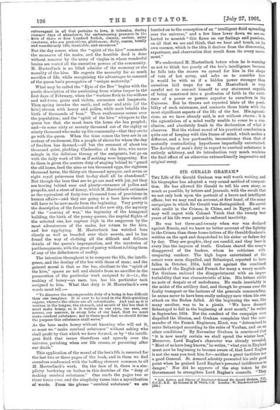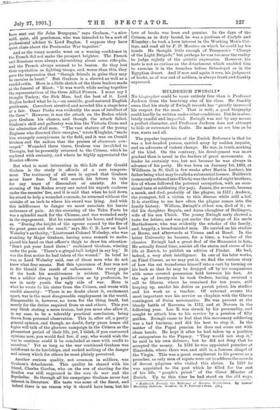SIR GERALD GRAHAM.*
THE Life of Sir Gerald Graham was well worth writing, and his biographer has adopted a very sound method of composi- tion. He has allowed Sir Gerald to tell his own story, as much as possible, by letters and journals, with the result that we not only look upon the portrait of a brave and intelligent officer, but we may read an account, at first hand, of the many campaigns in which Sir Gerald was distinguished. He served with credit in the Crimea, in China, and in Egypt, and we may well regret with Colonel Vetch that the twenty best years of his life were passed in enforced inactivity.
He was but three-and-twenty when war was declared against Russia, and we know no better account of the fighting in the Crimea than these home-letters of Sir Gerald Graham's, written on the spot and despatched to his sister or father day by day. They are graphic, they are candid, and they bear in every line the impress of truth. Graham shared the army's disapproval of the leaders, whom he criticises with unsparing candour. The high hopes entertained at. the outset were soon dispelled, and Sebastopol, reported to have fallen in October, 1854, held out against the combined assaults of the English and French for many a weary month. Yet Graham endured the disappointment with an imper- turbability that was characteristic of him. His letters strike no note of despair or of melodrama. He reads insatiably in the midst of the artillery duel, and though he groans over the faulty transport or the laziness of the generals commanding, he seems never to have been really unhappy save when his own attack on the Redan failed. At the beginning the war, like many another, was to be a picnic. " We have doomed Sebastopol to fall in the beginning of next month," he writes in September, 1854. But the conduct of the campaign soon dispelled the illusion, and Graham complains that the com- mander of the French Engineers, Bizot, was " determined to enter Sebastopol according to the rules of Vauban, and on no other conditions." By November Graham is convinced that " it is now nearly certain we shall spend the winter here." Moreover, Lord Raglan's character was already revealed. " Most of us have long known," he writes, " what you in England must now be beginning to become aware of, that Lord Raglan is not the man you took him for—neither a great tactician nor a good General. St. Arnaud adroitly presented his only good point when he praised Lord Raglan's personal indifference to danger." Nor did he approve of the step taken by the Government to strengthen Lord Raglan's councils. "They • Life, Letters, and Diaries of Lieutenant-General Sir Gerald Graham, Y.C. G.C.B., R.B. By Colonel B. H. Vetch, C.B. London: W. Blackwood and Soar have sent out Sir john Burgoyne," says Graham, " a nice• mild, quiet, old gentleman, who was intended to be a sort of professioliar adviser to Lord Raglan. I suppose they have quiet chats about the Peninsular War together."
And as the weary months went on a waning confidence in the French did not make the prospect brighter. The French and Russians were always skirmishing about some rifle-pits, and the French always seemed to be beaten. So they lost their reputation as fighting troops, and, worse than this, they gave the impression that "though friends in guise they may be enemies in heart." But Graham is a shrewd as well as a candid critic. Here is a little sketch of the three leaders made at the funeral of Bizot : " It was worth while seeing together the representatives of the three Allied Powers. I must say I thought Turkey, the Sick Man, had the best of it. Lord Raglan looked what he is,—an amiable, good-natured English gentleman. Canrobert strutted and scowled like a stage hero at a fair. Omar Pasha was evidently the man of intellect of the three." However, it was the attack on the Redan which gave Graham his chance, and though the attack failed, Graham's skill and gallantry won him the Victoria Cross and the admiration of all men. " The vast stature of the young Engineer who directed their energies," wrote Kinglake, "made him strangely conspicuous in the field, and it was on Gerald Graham and the sailors that the praises of observers con- verged." Wounded three times, Graham was invalided to Therapia, but he presently returned to the Crimea, which he explored with curiosity, and where he highly appreciated the Russian officers.
But what is most interesting in this Life of Sir Gerald Graham is the study it affords of a rare tempera- ment. The testimony of all men is agreed that Graham never knew fear. You will search his letters in vain for any trace of discomfort or anxiety. At the storming of the Redan every one noted his superb coolness under the enemies' fire, and it is said that when he laid down his sword to help a wounded comrade, he returned without the mistake of an inch to where his sword was lying. And with this indifference to danger we must associate his heroic endurance of pain. At the storming of the Taku Forts he was a splendid mark for the Chinese, and was wounded early in the engagement. But he remounted his horse, and fought on. "During the height of the uproar caused by the fire of the great guns and the small," says Mr. C. R. Low on Lord Wolseley's authority, "Lieutenant-Colonel Wolseley, who was standing by Major Graham, having some remark to make, placed his hand on that officer's thigh to draw his attention.
• Don't put your hand there !' exclaimed Graham, wincing under the pain. There's a gingal-ball lodged in my leg.' It was the first notice he had taken of the wound." In brief he was, as Lord Wolseley said, one of those men who do not know what fear means. But this ignorance of fear was not in Sir Gerald the result of callousness. On every page of the book his sensitiveness is evident. Though he was a soldier always by predilection as by profession, he saw in early youth the ugly side of war. Here is what he wrote to his sister from the Crimea, and wrote with candid sincerity : " There is no doubt about it, excitement apart, war is the most disagreeable employment in the world. Disagreeable is, however, no term for the thing itself, but merely for the duties required from us and others. This you may think stating a mere truism, but you must also allow it, in my case, to be a tolerably practical conclusion, being drawn from personal observation. This is, after all, a pretty general opinion, and though, no doubt, forty years hence old fogies will talk of the glorious campaign in the Crimea as the pleasantest period of their life, yet, I think, if you canvassed opinions now, you would find few, if any, who would wish the war to continue could it be concluded at once with credit to ourselves." Yet as long as the war continued Graham was indifferent to its hardships, and reeked nothing of the danger and misery which for others he most plainly perceived.
Another curious quality, not common in soldiers, was Graham's detachment. This quality he shared with his friend, Charles Gordon, who on the eve of starting for the Soudan was still engrossed in the coco de mer and the Seychelles. So through all his campaigns Graham never lost interest in literature. His taste was none of the finest, and indeed there is no reason why it should have been, but his
love of books was keen and genuine. In the days of the Crimea, as in duty bound, he was a partisan of Carlyle and Kingsley ; he took a keen interest in the Working Men's Col- lege, and read all by F. D. Maurice on which he could lay his bands. He thought little enough of Tennyson's " Charge of the Light Brigade," but perhaps he was too near the reality to judge rightly of the artistic expression. However, his taste is not so curious as the detachment which enabled him to exercise it in the trenches before Sebastopol or in the Egyptian desert. And if now and again it errs, his judgment of books, as of war and of soldiers, is always frank and frankly expressed.



































 Previous page
Previous page